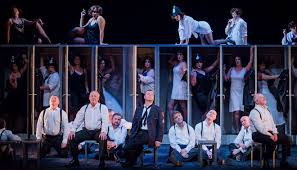Mayflower Theatre, Southampton 25 March 2015
In over fifty years of visiting, and later reviewing, performances by WNO, the chorus has always been its greatest strength. Productions may at times have been questionable and just occasionally singers not quite what had been expected but the chorus has never failed us. Something about the air in Wales I suppose!
It was therefore more than appropriate that they should be celebrated with a production all to themselves and one carefully crafted to show not only their vocal but their dramatic ability. Rather than a series of bleeding chunks, David Poutney has created a narrative line which links the individual choral items into a whole and gives us a sense of progression. The evening opens strongly with the first chorus from Prokofiev’s War & Peace. Here the sense of external attack is linked to the internal attack felt by the villagers in Peter Grimes, which in turn flows into work and finally to the army, where Lesley Garrett joined them for the Rataplan chorus from La Forza del Destino. A slight change of pace brought on the night but the dawn gave rise to decadence and corruption. The chorus were obviously enjoying themselves here in excerpts from The Rake’s Progress, Mahagonny and Lady Macbeth of Mtsensk. Possibly the most entertaining sequence was linking the cigarette chorus from Carmen to the Policeman’s lot from Pirates- and all set in a locker room! The wedding scene from The Cunning Little Vixen brought the first half to a riotous close.
The second opened at almost the same level of enthusiasm with a Hollywood style first night setting for the opening of act 4 of Carmen. As if the decadence could go no further there was a sudden but fleetly handled change to a religious mood, with a splendidly choreographed Hallelujah Chorus and Panis angelicus. The heart of the second half came with an extended section from Khovanshchina which allowed the chorus to demonstrate a rapid change of mood and constant free-flowing movement. The fear of attack from outside brought us full circle, and the lowering of the barbed wire fence for Va pensiero was very moving. It was only at this point that David Poutney seemed to lose his nerve. It would have made good sense if To dream the impossible dream had been kept within the prison camp and the final glorious chorus from Candide allowed to show as hope overcoming adversity. In the event the Dream number reverted to Sunday Night at the London Palladium with Lesley Garrett in a red dress and a solo spot. It was unconvincing and an anti-climax after so much that had been so good.
Individuals from the chorus took the scattering of small solo parts and Howard Kirk was particularly impressive at the end as Candide. Alexander Martin had manoeuvred his way with skill through the many scores and at no time was there any sense of an uncomfortable jump from one genre to another.
One final point. Each scene was totally convincing within itself. The action and singing was more than sufficient to convey the intensity of the narrative. Perhaps we need to learn again what Wieland Wagner realised when penniless at the end of the war – you don’t necessarily need large or expensive sets for a production to be highly effective.

